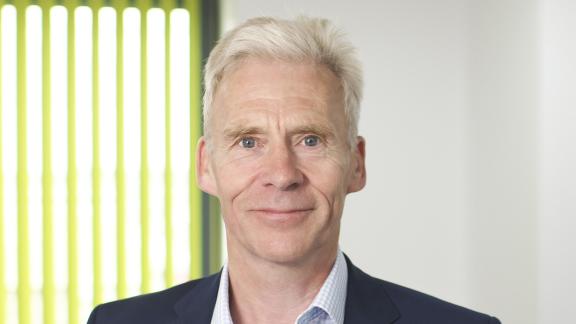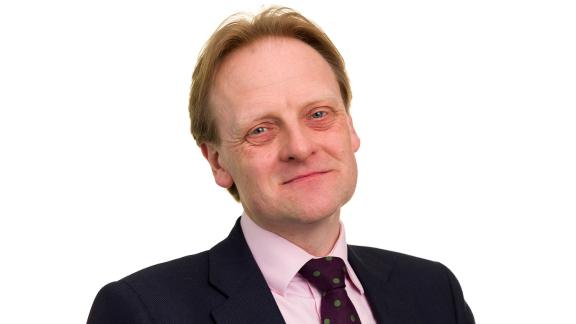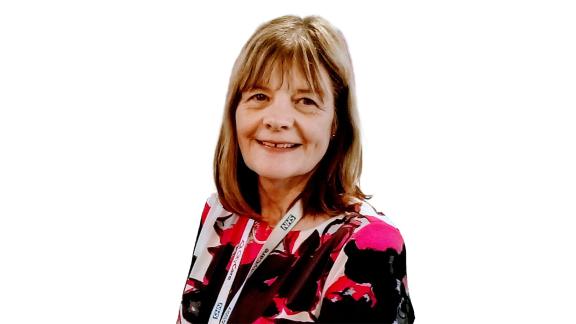Ian Hutchison: 'Care has got to be focused around the individual - both as a patient and also as an individual'

Celebrating Community Services week is an annual celebration of the role, breadth and importance of community services. For 2024, we spoke to a selection of leaders from the community sector about what makes them proud to work in community services and why it is important they are empowered.
Ian Hutchison is chief executive of East Coast Community Healthcare CIC, a community interest company which provides a range of NHS community services across Norfolk and Waveney.
Can you tell us about the range of services you provide at East Coast Community Healthcare?
In terms of the services we deliver, we run an integrated set of community teams. which we call Primary Care Home teams. These are an integrated group of nurses, occupational therapists, physios, pharmacists, and dietitians who all work as part of a single team. It means there's single front door - so there's no wrong front door - and a single team working together for the good of the patient.
Rather than having siloed teams where we'll be referring a patient between teams, we bring the right person to the right team, and I think that's the crucial thing about the way community services operate – it has got to be focused around the individual both as a patient but also as a person.
We also run an intermediate care ward for people who need just a little bit of help after they've been in hospital, or been referred by their GP – and might need some therapy to get them back on their feet so they can be independent and back at home. And we have many other specialist services as well such as cardiac rehabilitation, a frailty and a dementia team and we provide Specialist Palliative Care in partnership with a local hospice.
What would you say makes you most proud of working in the community sector?
That's really easy. It’s the staff. It’s a very demanding going into people's homes, where they may never have been before, possibly very early in their career, and using their initiative to really assess the situation and work out what is best for the patient, focusing the care around that individual in their home setting. The resilience, the responsibility and the way that people work in that environment, I think is really, really impressive and quite humbling.
But for our frontline staff to do a great job, we have to have equally dedicated people in our support functions, like administration and HR. We can't afford to work in silos. As a staff owned organisation, we’re one big team with support staff absolutely part of the vital machine that that helps us deliver the highest quality services we can possibly provide.
Could you tell me a bit about the positive impacts that your local community-led initiatives have had on the populations you serve?
I think the first is our integrated model that we've talked about, as we bring lots of the different capabilities together with one point of access and a completely holistic approach to people’s care.
That single deployable resource makes sure that the patient sees the right clinician every time and our service is really, really closely integrated with local GPs and digitally linked in with them as well so your GP will know exactly what care you’re receiving at every stage.
We're making it as easy as possible and working really, really closely with our councils - in our case Norfolk County Council and Suffolk County Council - to make sure that we're delivering the very best service, centred around the patient and linked in with social care services whenever necessary.
I think another example I'd use is really again on the collaboration theme and it's some work that we did with the NHS Trust that shares our Integrated Care System, Norfolk Community Health and Care NHS Trust, and it was around a community musculoskeletal physio service.
For historical commissioning reasons there were a range of different services across the area provided by the two organisations - now we have come together and said ‘we can do this better’ and developed a plan that brought all of the services up to the very best standard, rather than making a compromise.
It means wherever a patient lives in Norfolk and Waveney they will receive the same care and we’ve put a digital core absolutely at the centre of the work we're doing so patients have more freedom to refer themselves into the service, book and cancel appointments online and access a huge library of self-care resources. We believe it’s the first time two organisations have worked together to achieve this in the UK.
I think really, really interestingly we had a different relationship with the ICB in terms of the way that we put this together. So rather than being a traditional commissioner-supplier relationship, we took initiatives forward. We said ‘look, we think we can do this if we do this from the perspective of the whole Norfolk and Waveney area’. So, it really was collaboration. We're six months into it, but already we're seeing a significantly better service that's being delivered to the patients.
Why do you think that it's important that we empower community services?
The centre of our role is to keep people well, independent, and living as good a life as possible in their own home and working really closely with GPs, working with social care, working with the voluntary charitable sector as well and the local government councils at various levels.
We have in the NHS a tendency sometimes to over-medicalise issues and people's lives are more complicated than that. So, one of the things that we can do as a community service is really act as that binding agent that brings those elements together, keeps the person - and I'm saying the person, not the patient, because it's not just their medical conditions that we're interested in - absolutely the centre of what we do. The more we can do that, the more we can keep people well in their own homes for as long as possible, living a good life independently, then it's much better for the individuals.
It's also much better for the rest of the system because we're then not using all of the other resources that that we know are under such significant pressure at the moment.
So, empowering communities, giving them the ability to really do their very best job to keep people well and at home, helps everyone. The more we can do it the better.
How do you think that community providers can be enabled to go further faster to support Labour's ambitions to shift to a preventative, community-based model of care?
We've got a great NHS service, but it's really built around acute hospitals and about treating individual conditions in the most effective manner.
If we're going to do what the government wants to do, which is about moving care much closer to people's homes, then we've got to find a way of having the conversation that starts to look at what the opportunities are.
I think the more we can bring community services into that, the more we can start to really explore different ways of working with community services, the better. If I give you an example, the use of virtual wards, which really were set up initially very much around helping with discharge out of acute hospitals.
Really integrated virtual wards may help with getting people out of hospitals, but actually their first role should be to be working with GPs, with social care, to just give that care in people's homes so that they never have to go into hospital in the first place or only have to go under the most extreme circumstances.
Community services have generally not been funded as well and funding increases have not been as great as in other parts of the health system. We need national policymakers to be really starting to consult with providers of community services, giving them the resources and starting to experiment and find out what is possible. [How do we] unlock something and unlock a different model of care that's very much based around the person and really with the focus of keeping them as well as possible and at home for as long as possible?
What is the one key ask that you have of the new government?
I'd say lots of governments, lots of different people in various leadership positions across the NHS for a long time have been talking about ‘left shift’, moving services into the community.
But there always seems to be a reason not to do it and there always seems to be a short-term imperative - the ambulance delays outside emergency departments or others.
I think we need to commit to this. And if we really commit to it, we've got the ability to unlock something that fundamentally changes the way that we run our health services and brings it much closer to the individual, brings it in a far more integrated way that looks at the person as a whole and looks to treat their medical conditions as part of that wider picture of all round wellbeing.
Now if we can bring far greater collaboration, particularly between health and social care, which I know we're trying to do, we need to take that further and really take seriously the investment in community services and give them the resources to find out what's possible, then I think we can unlock this in a way that we haven't been able to over a number of decades.



